Where does Joseph Fleming fit into the equation?
Collapse
X
-
-
Hi Debs, many thanks.Originally posted by Debra A View Post[*]Statement of particulars giving personal details of name age last address etc.-Dated 4th July 1892 Named as James Evans only. Name of relative given as Mother- Henrietta Fleming [ address detail for her has been corrected from 261 Nile Street to 216 Bleytons buildings East Rd].
[*]City of London Union draft letter addressed to Mrs H Evans 261 Nile St St Luke, dated 7 July 1892 informing her that her 'husband' [crossed out and 'son' added over top] was being transfered to Stone.
[*]Order of removal. several pages.Named as Joseph Fleming alias James Evans. Dated 19th October 1893[*]Settlement examination report .Named as Joseph Fleming alias James Evans.Dated 17th October 1893 His birthdate,baptism date and parents details are included in this report. Parents address given as 216 Bleytons Buildings, Nile Street, East Rd. [Given the number and that both addresses for Henrietta of 261 Nile St and later 216 Bleytons Buildings Nile Street East Rd is it possible that 261 Nile Street was an incorrect address and Henrietta may never have recieved any of communications about her son originally?]
I don't think it's likely. There is an occurrence of Henrietta Fleming and her correct address in the "statement of particulars" on July 4 1892, and "husband" crossed out in a letter dated July 7.
I think Fleming has initially mentioned Henrietta Evans as one of his relatives, without further detail. Then they have supposed she was his wife, and the mistake seems to have soon been corrected.
If Henrietta hadn't come to the asylum before October 1893, there would be some comments about it in the records (mere speculation, but plausible).
Comment
-
Sorry gonna say one thing, then gonna shut my mouth.
The record states this cat is 6'7". So he's 6'7" until it can be proved otherwise. Sorry, he ain't "JTR". Maybe killed "MJK", doubt it though. He should be scrutinised like crazy. All should be. Lordy, Lordy, Lordy. The Spinal Tap approach, eh?Last edited by Digalittledeeperwatson; 07-19-2013, 09:44 AM. Reason: slight mockery and Spinal Tap ref. quote Eric Cartman, "I love you guys."Valour pleases Crom.
Comment
-
Thanks for that Debra
So it seems that Evans/Fleming gave the incorrect address for his mother in July 1892, and the name Evans.
I notice that on the ‘next of kin’ letter that you posted up the word ‘mother’ was clearly added at a later date.
As you suggest I doubt that the letter addressed to Henrietta Evans at 261 Nile Street would have got to Henrietta Fleming at 216 Bleytons Buildings, Nile Street.
It still remains to be resolved when it became known his real name was Fleming and when his mother got in contact – and how she got in contact.
That can perhaps be gauged as some of the details (such as the ‘mother’ one I mentioned above) will no doubt show signs of having been added at a later date.
Is it possible to reproduce the documents that no longer appear to be available on line?
Such as
• First page Named as James Evans Justice of the peace and surgeon examination declaration. 'Joseph Fleming alias' added above the name James Evans. dated 4th July 1892, Justice Room Guildhall
• Second page City of London Union Order of Reception of a Pauper Lunatic or Lunatic wandering at large-Named as James Evans only
• Transfer expense form from Guildhall to Stone for James Evans
• Statement of particulars giving personal details of name age last address etc.-Dated 4th July 1892 Named as James Evans only. Name of relative given as Mother- Henrietta Fleming [address detail for her has been corrected from 261 Nile Street to 216 Bleytons buildings East Rd].
• Certificate of medical practitioner. Dated 2nd July 1892 Named as James Evans
• City of London Union draft letter addressed to Mrs H Evans 261 Nile St St Luke, dated 7 July 1892 informing her that her 'husband' [crossed out and 'son' added over top] was being transferred to Stone.
• Letter from CLU relief officer dated 5th July 1892. 8/- belonging to James Evans deposited with treasurer.
• Clothing and belongings inventory receipt of James Evans articles dated 5th July 1892
• Letter dated 8th November 1893 headed Bethnal Green Board of Guardians asking for depositions of Fleming's case to be forwarded as the writer hasn't had time to look at it , that includes the paragraph:
"Will you also kindly let me know by bearer in what parish 70 [and a half] Lower Thames Street is situated in."
• Adjudication letter headed Frederick William Crane Clerk and Superintendent Registrar dated 24th November 1893.Named as Joseph Fleming alias James Evans. Maintenance transferred to Bethnal Green from 16th October 1893. Addressed to Stone asylum.
I see Evans/Fleming had 8 shillings on him – enough for alternations to his clothing if need be?
The adjudication letter that was sent to Stone seems to be the only communication with that establishment following the removal of Evans/Fleming from the City of London Union’s responsibility.
The 70 ½ Lower Thames Street thing may be a red herring then?
I thought it was too far from Bishopsgate Police station for Evans /Fleming to have been taken there.
I think it was on the north side of Lower Thames Street and I think in St Dunstan in the East parish.
Lower Thames Street has a swerve now leading it up to Byward Street and Tower Hill. It used to go straight up to the Tower. I am pretty sure 70 ½ was on the corner of Water Lane. That whole area has been long redeveloped. A bit of Water Lane still exists, south of the old lie of Lower Thames Street, immediately to the east of the old Custom House.
There is a will at the National Archives of a Thomas Bergan of 70 ½ Lower Thames Street from December 1854.
There’s an interesting case here from 1883:
In 1883 a fish porter called William James Webb lived at 70 1/2 (from a baptismal record). It was only over the road from the then Billingsgate Market.
It Involves DC William Hutt (not to be confused with George Hutt, although I wonder if they were related) and Halse from the City Police getting a couple of people send down for theft and receiving of two bags of coffee that was delivered to offices at 70 Lower Thames Street.
Comment
-
I understood you perfectly, Colin, and applaud you for your conservatism. For what it's worth I suspect that you are still being overly generous with both descriptives, meaning that in all likelihood a 6' 7" East Ender would be rarer than even your amended projection.Originally posted by Colin Roberts View PostA mean height of 5' 6", and a standard deviation of 3" would probably be more accurate, but my intention was simply to address Jon's utterly fallacious assertions ...
Comment
-
One aspect that I think is interesting to have come out from the information Debra has posted is that Evans/Fleming was taken to the Guildhall to have his detention sanctioned by a court. From there he was sent to Stone.
Garry
if we are going to be picky then it can be added that the East End contained different populations - the average height of some would be greater than others. For instance the Jewish population would almost certainly have been on average shorter.
Comment
-
I notice that the supposed “unreliability” of Barnett is still being touted by some as a brownie point in favour of the Claybury Fleming not being Kelly’s ex, but I’m afraid it remains nonsense. Barnett described a man named Joseph Fleming from Bethnal Green who worked in as a plasterer, and this description “coincides” precisely with the description of a real person – an actual plasterer called Joseph Fleming who came from Bethnal Green. To argue that this amounts to mere coincidence and nothing more is appallingly unrealistic, as anyone can see. It has therefore been established, way beyond reasonable doubt, that the Stone/Claybury inmate and son of Richard and Henrietta was the Joseph Fleming referred to at the Kelly inquest.
Moreover, it is quite clear from the comments of Mmes. Venturney, McCarthy and Pheonix that they were referring to this same Joseph Fleming. Despite not mentioning the surname Fleming, Julia Venturney reported that Kelly had been “fond” of a man named Joe, and “fond” was precisely the same expression Barnett used to describe Kelly’s feelings for Joseph Fleming. The obvious and reasonable inference here is that the two witnesses used the same expression because it was the same one Kelly herself used in reference to the same person, Joseph Fleming.
And of course, no mention of a gargantuan height and emaciated physique, which would certainly have been mentioned if Fleming had both.
This same “Joe” was reported by Mrs. Venturney to have “ill-used” Kelly because she was living with Joseph Barnett. Despite a rather odd claim to the contrary, this by no means constitutes remotely normal behaviour if the “Joe” in question was merely a regular client, and Venturney makes it quite clear that he wasn’t one. There is no way he’d duff Kelly up purely for living with the boyfriend unless he was mad and deluded…as Fleming, coincidentally, was! The “Joe” in question was believed to be a costermonger, which is perfectly consistent with the downward spiral of Fleming’s employment status. We know he went from earning a decent, respectable wage as a plasterer to the bottom of the barrel as a dock labourer, and he may have done odd jobs such as “costermongering” in between. If so, he would have been accustomed to very late night solo trips to places like Romford on his “country rounds”. The dramatic decline of his employment prospects may well have been due to his deteriorating mental health.
What is this I keep reading about the police supposedly checking the asylum records as late as 1893?
Any evidence at all for this?
In view of the fact that Fleming was a known user of an alias who only moved into Whitechapel in late 1888, the overwhelming likelihood is that the police never tracked him down. There is no evidence that the police ever uncovered the true identity of the man known as James Evans who was found “wandering at large”. Once ensconced at Stone, there is no evidence of any further police interest, and certainly no evidence of any checking of the registers in 1893 in the hope of finding Jack the Ripper. As Sally points out, if the head of the CID had already convinced himself and others that they had their man, there was no point looking for the killer in the asylum registers, especially not as late as 1893. This would not have amounted to a “blunder” on the part of the police either. Unlike today, it was no easy task to trace people, especially if the individuals sought were in the habit of moving around a lot, didn’t advertise their presence, and used aliases. Unless you mean it was a blunder that the registers were not checked as late as 1893, in which case, that’s something you’ll have to take up with the ghost of Sir Bob.
I might just be having terrible, terrible nightmares, but I thought I saw Lechmere claim that Fleming was more likely to have been investigated and cleared than Charles Cross, despite the fact that the former was almost certainly never traced, whereas the latter was interviewed by the police, appeared at the inquest, and discovered the body of Polly Nichols. I’m afraid we might require the swift intervention of the Thought Police for that one. If you, Lechmere, wish to argue that Cross may not have been investigated as a suspect, then we certainly get to argue that Fleming almost certainly wasn't even located in order to be investigated as a suspect, let alone cleared as one.
So what would happen then if we accept the exceptionally unlikely scenario that the police investigated the 1893 asylum records and spotted Joseph Fleming? What was the realistic outcome of any “checking out” attempts?
“Hello Mad Joe, we think you might be Jack the Ripper, so can you tell us where you were on a specific night five years ago?”
“Why yes, Mr. Isaacs, you and I were flinging coconuts together on the Mile End road, remember? I’ve got a lov-er-ly bunch of coconuts, diddly-deedee. Sing with me, Isaacs! Sing! Before the bad men come to kill me! Hoohoohahahaha!”
“Um, yeah, we’ll come back later…”
We’ve had some very confusing long posts that appear, at a cursory skim-through, to be very unconvincing attempts to duck and dive around the fact that the erroneous age appears to have remained uncorrected despite the medical authorities evidently being in contact with the mother, and despite the fact that she would have been able to supply them with her son’s correct age.
I think we’re all done with the height issue now. Debs would not have suggested that the height may originally have been recorded in inches and then erroneously transcribed as 6’7” unless her experience informed her that it was a plausible explanation, and it appears her experience trumps that of the naysayers. I’m not “seizing” onto anything, but merely acknowledging the merit of the suggestion, as I do with the observation that Fleming was unlikely to have had easy access to fitting clothing if he was that tall and that poor.Last edited by Ben; 07-20-2013, 01:36 PM.
Comment
-
Ben
If you want to convince yourself that there is absolutely no reason to doubt that Evans/ Fleming was Kelly"s economic then don't let me stop you
I didn't realise that details of Fleming's wages in his various trades was known - you are an expert researcher Ben!
Was it reported that Hutch showed signs of poor mental health? Again I presume that another outcome of your research.
You are of course aware, being conversant with this case, that the private opinions of certain senior Scotland Yard officers, expressed in later years and probably not held in 1893, that the case was 'solved' was not shared by the officers on the ground and that the case was still open in 1893?
So you think the police didn't track Fleming down in 1888. I presume you would agree that they may have made some effort even if it was unsuccessful?
In which case they would have still been interested in finding him and the division in which he was supposed to live would probably be more likely to remember the missing Fleming than others - don't you think?
If they had found Fleming in the register then although it may not have gone anywhere, we should expect a reference somewhere as I stated.
As for Charles lechmere comparisons and the detail about Fleming"s age - and the significance or otherwise of the military height record or Fleming"s clothing - I suggest you read what was said properly rather than skim as you have shown a lack of comprehension.Last edited by Lechmere; 07-20-2013, 02:08 PM.
Comment


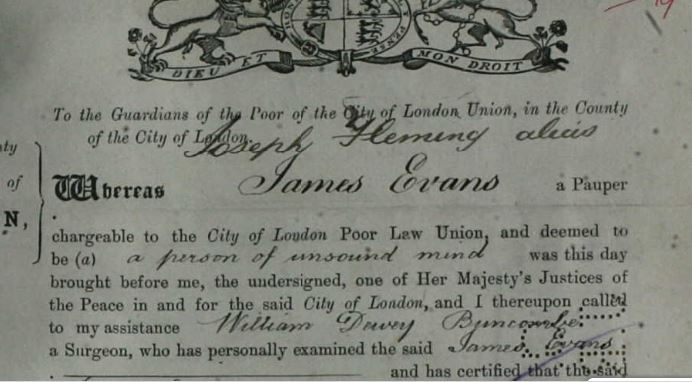




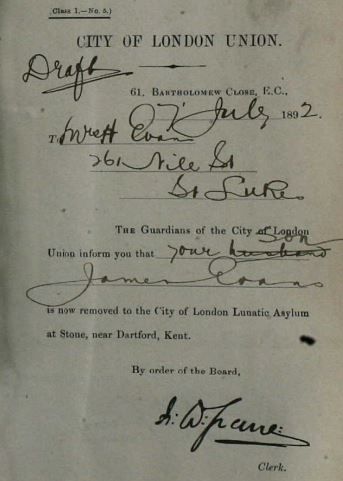

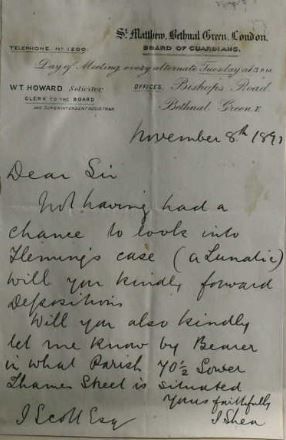
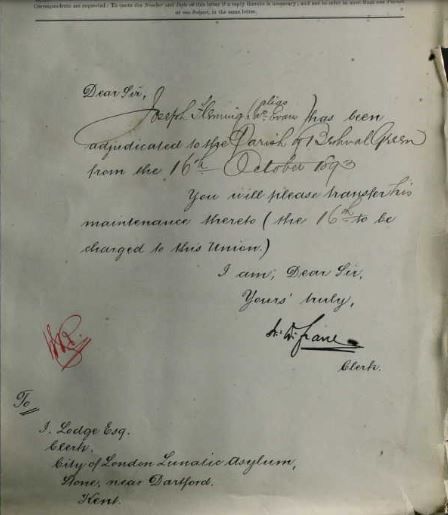
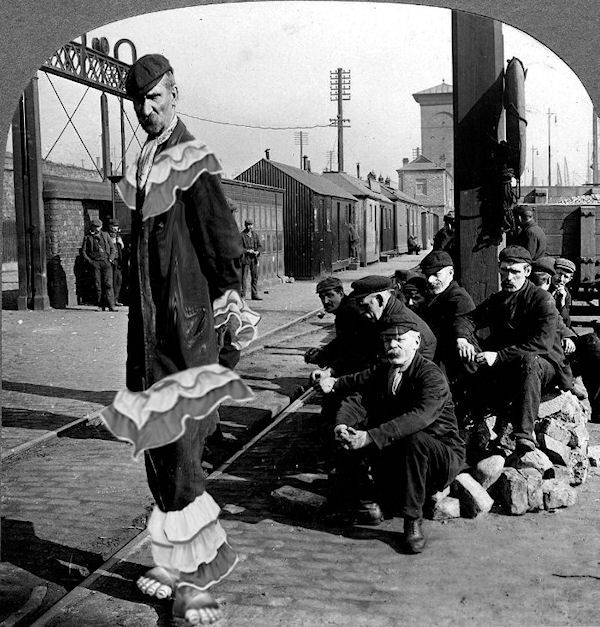
Comment